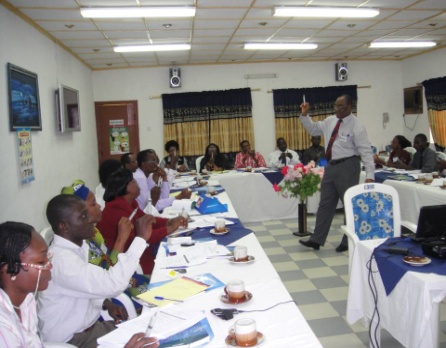Medical Transmission / Injection Safety Program
 |
| Demonstrating the safe use of needles and syringes during a training session |
Of the 16 billion injections given worldwide each year, about 50% are unnecessary and unsafe, according to World Health Organization estimates. When unsterile injection equipment or dirty needles are mishandled or reused, both patients and health care workers are at risk of being infected by human immunodeficiency virus (HIV) and other blood borne diseases such as hepatitis B and C. High patient demand for injections in Nigeria and health workers’ willingness to provide them create greater need for new, sterile injection equipment and a means of disposing used “sharp wastes” safely. Inadequate disposal of waste contaminates the community, exposing the wider public to health risks.
The Medical Transmission/Injection Safety project uses an evidence-based field approach to improve and sustain injection practices and health care waste management through policy development, and partnership with health care workers. It also promotes prevention of mother to child transmission of HIV, and safe male circumcision through raising awareness of best practices in communities. The technical approach includes training, logistics management, behavior change communication, health care waste management, safety of health care workers and monitoring and evaluation.
Through USAID implementing partner AIDSTAR-One, the Medical Transmission/Injection Safety project currently works in 30 local governments in Bauchi, Benue, Cross River, Lagos and Sokoto States and the Federal Capital Territory. The project ensures that trained health care workers safely administer necessary injections, use appropriate safe injection devices; and that health care waste is efficiently managed using methods that are secure for the community and the environment.
PROGRAM SNAPSHOT
- Project Name: Medical Transmission/Injection Safety Program
- Life of Project: 2009 - 2012
- Budget: $6,225,000
- Implementing Partner: AIDSTAR-One
- Geographic Areas: Bauchi, Benue, Cross River, Lagos, Sokoto, the Federal Capital Territory and other states as required by Government of Nigeria and PEPFAR

